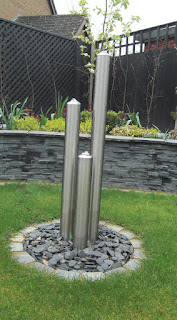The healing power of gardens is widely acknowledged and providing a sensory/memory garden can really help patients suffering from age-related degenerative disorders.
Patients with Alzheimers and dementia have very specific needs and a garden needs to be designed that caters very carefully to these requirements. Alzheimers and dementia sufferers tend to wander and get lost and are easily confused when given too many choices. Declining mental function causes anxiety and disorientation and in some cases aggressive behavior. Having access to a garden has been proven to speed up recovery from injury, reduce blood pressure, anxiety, stress, pain and aggression.
As well as helping reduce the physical
symptoms of age-related diseases a garden designed specifically for those with
Alzheimers and dementia can help the psychological welfare of patients. A well designed garden can assist with
remembering past experiences and provide subjects for discussion with family
and friends. It can stimulate the brain
with refreshing colour, scent and sounds of wildlife. The garden will be a
sanctuary, provide space for private reflection, and allow patients to re-connect
with the outside by creating a more normal, familiar environment.
It's important to create shade without dark shadowy areas as these can appear threatening those with age-related degenerative conditions. Distinctive landmarks like brightly coloured pots, or a summer house, or maybe even a bus stop will help patients orientate themselves in the space, feel safe and reassured.
Boundaries should be screened so that users feel enclosed and safe as a view of a busy street might be scary and confusing to garden users. If any residents are more able a vegetable garden or space for keeping chickens can be really beneficial.
Other features should be included that stimulate memory and conversation and create a feeling familiarity. These include feeding stations for birds and other wildlife, old telephone boxes or post boxes, and traditional plants like Roses and Lavender.
The garden should also important to stimulate sensory memory. A small water feature with a closed water reservoir will give the sound of running water without presenting a safety hazard.
Plants should be selected for scent and texture with leaves and flowers that can be touched and picked. Plants that can be touched should be non-toxic and without sharp spines, or prickles. Plants should be included that attract birds, insects and other wildlife into the garden.
 |
The memory sensory garden should be a rich
environment that can be enjoyed throughout the four seasons of the year and
needs to be carefully planned to make a person with dementia or Alzheimers feel
safe and willing to explore the enclosed world around them.
If you would like help creating a sensory memory garden you can contact me through my Web site. You can seem more examples of my work on Facebook, Pinterest, and Houzz.











No comments:
Post a Comment